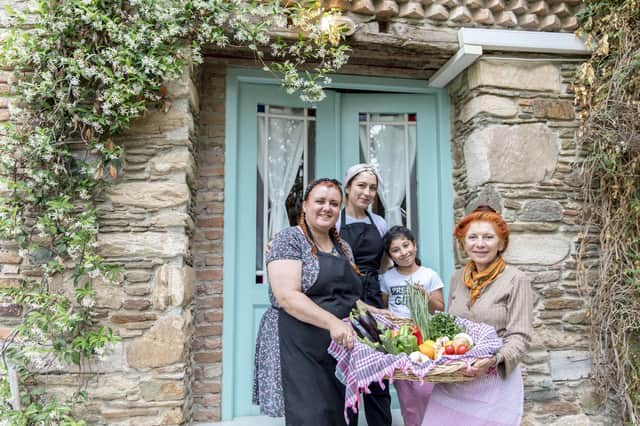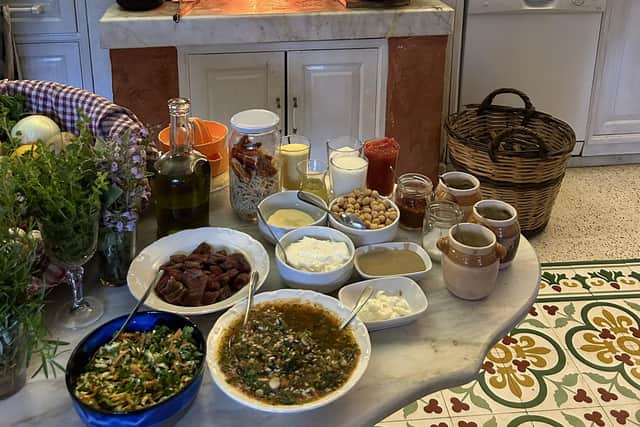Travel: Cooking up friendships and fun in Turkey


My eyes are drawn to an enormous spread of food that includes homemade borek, mantu (a type of dumpling) filled with minced meat and sun-dried eggplant. Our local tour guide Aysenur Genc explains that this is a “golden days” lunch in Turkey.
The event takes place in apartment buildings across the country, with a new host each month. The host cooks for neighbours and is then given a gold coin for her efforts. These gold coins are a form of financial support for women who don’t work, but want their own money.
Advertisement
Hide AdAdvertisement
Hide AdThe Golden days lunch is embraced by many in Turkey. It’s a fun way of coming together with friends, gossiping and enjoying good food while also being able to save money.


While we eat, Seray tells us she dreams of becoming a CEO and that she wants her daughter to be an independent woman “who does whatever she wants to do”.
She and her family are proof that women in Turkey are forging their own paths in life, which I witness first-hand on a condensed version of Intrepid’s new 12-day women’s only expedition.
The expedition – run by the world’s largest certified travel B Corporation and aimed exclusively at female travellers– aims to show off the traditional and modern wonders of Turkey through the lives of the women who live there. The itinerary is designed to create economic and social opportunities for women through tourism, while highlighting the beauty of the country.
Advertisement
Hide AdAdvertisement
Hide AdOn our first night, I’m introduced to Ayse Zeynep Sezerel, the proud owner of No.11 hotel in Galata, Istanbul, the first independent hotel in the city with an international GSTC green certification. Her hotel doesn’t use any plastic bottles or straws and she’s even created a small agriculture area on the terrace, where nearly 30% of organic waste has been turned into fertiliser.
On our first morning, we walk from the hotel to Nahil, a shop that serves as the commercial enterprise for the Foundation for the Support of Women’s Work (KEDV). We meet co-founder Sengül Akçar, who shares more about the organisation’s work. Along with a group of friends, she started KEDV in 1986 to help women with childcare in poor areas, working “for the collective, not just the individual woman”.
I learn about the struggles Turkish women are facing in today’s society and am blown away by the incredible work that Sengül and the rest of the team do on a daily basis. Now, KEDV is an Oxfam partner and reaches tens of thousands of women and children each year from all over Turkey. Sengül, I soon learn, is one of many female powerhouses emerging in the country.
As I arrive in Adatepe, one of the oldest villages in Turkey, I’m welcomed by goats, cats and roosters on cobbled streets. Surrounded by mountain views and 200-year-old olive trees, it’s a world away from the busy streets of Galata.
Advertisement
Hide AdAdvertisement
Hide AdWe’re staying at Hunnaphan Hotel, a historic building from the 18th century transformed into a hotel with a focus on sustainability. Run by a mother and son, it’s a popular spot for yoga retreats.
After settling into our rooms, we visit a café called Sabun Mavras, owned by sisters Nur and Melike, who also run an olive oil factory – roles that, in the past, may traditionally have been carried out by men.
The following morning, we go to Ayvalik, a seaside town on the north-western Aegean coast. Here we meet Tara Hopkins, a Californian who runs Çöp (M)adam. Translating to Garbage Lady, the boutique sells tea towels fashioned from flour sacks and wallets made from plastic packaging.
The store is also a social enterprise, employing 500 women in the past 15 years, including many who have never received a salary before. “The breadth of opportunities for women in Turkey has expanded and women stand a bit prouder now,” says Tara.
Advertisement
Hide AdAdvertisement
Hide AdWe continue to Sultankoy, a social enterprise established with the intention of protecting, developing, and marketing the art of carpet weaving. Ninety-five per cent of the weavers are female “because women have stronger eyesight, smaller fingers and more patience than men”, according to Emre Eren, a second-generation carpet expert. The women also receive government support in the form of free healthcare and tax-free income.
The traditional role of a carpet weaver has always been carried out by women, and the social enterprise wants to attract more women to the job in an attempt to keep the skill alive.
Food is central to Turkish culture and famous chef Mujde Tonbekici is dedicated to creating opportunities for women. She owns the Nisanyan Hotel, tucked into the historical mountain village of Sirince, near Selçuk.
For dinner, we’re treated to a cooking lesson by Mujde, who insists everyone should experience “village style hospitality”. While we cook, I can’t help but notice the strong feelings of love, empowerment and solidarity in this kitchen. I’m surrounded by women from all around the world, of different ages, who are all bonded by one thing – the shared experience of being female.
Advertisement
Hide AdAdvertisement
Hide AdThe mix of new and old is what makes Turkey a popular holiday destination. Now, with women embracing both traditional and modern roles, it’s an even more exciting time to visit.
How to plan your trip
Intrepid (intrepidtravel.com) offers the 12-day women’s-only Turkey expedition from £2,195pp, including flights, transport, activities and most meals. Departures from April 2024.